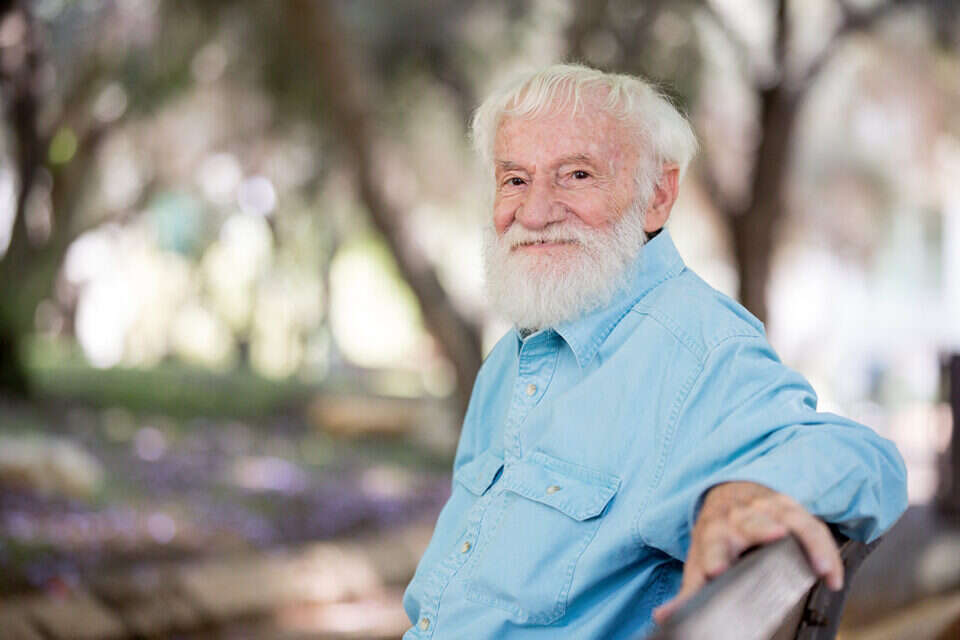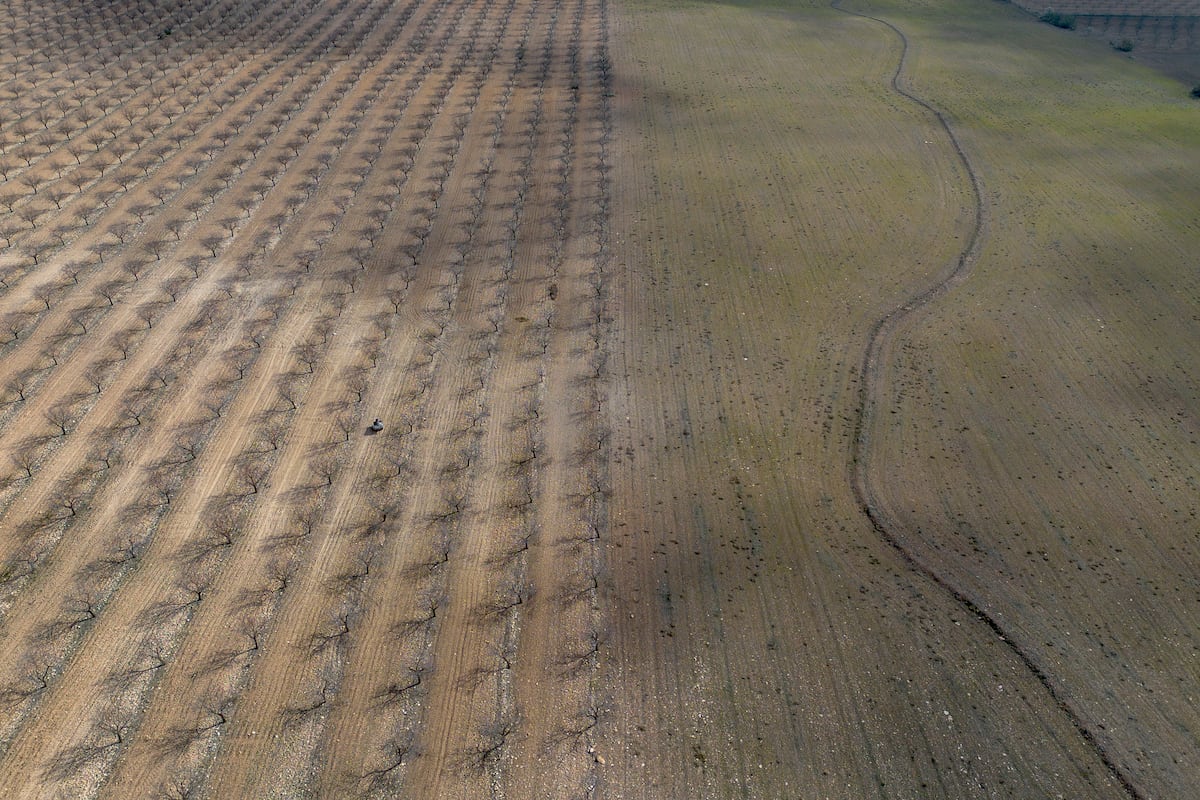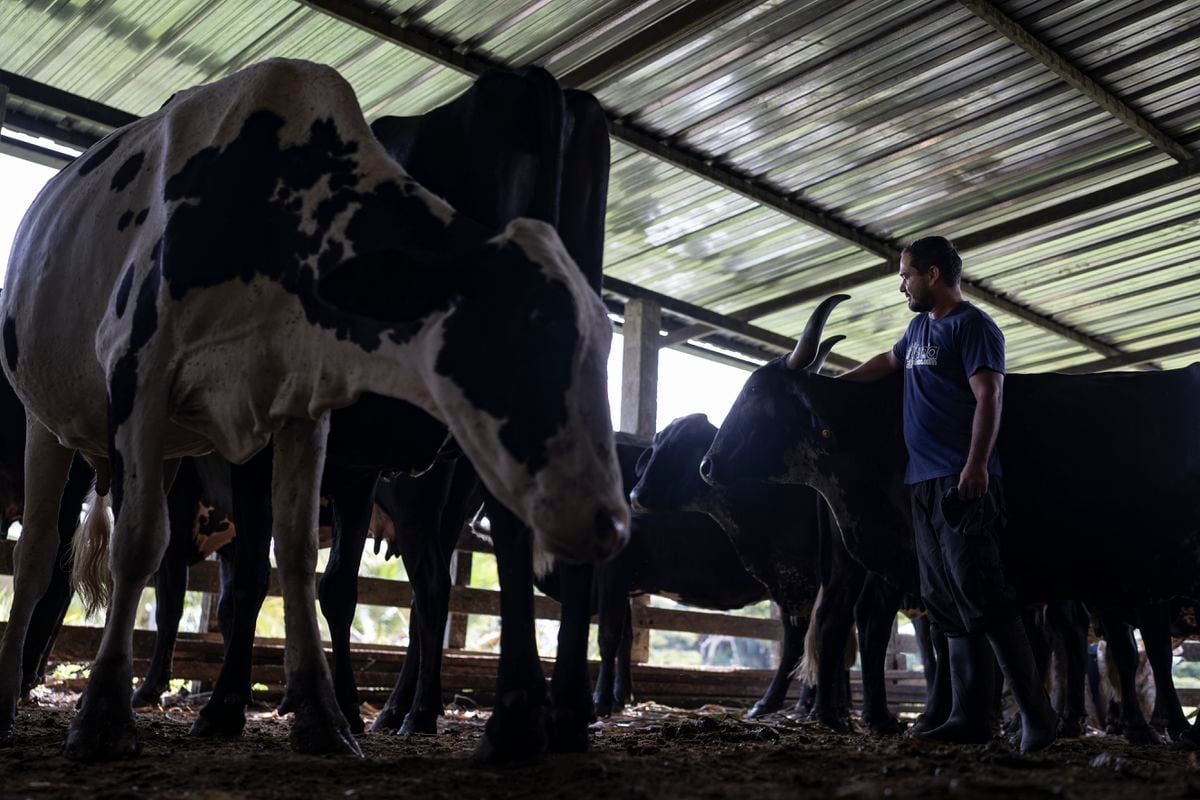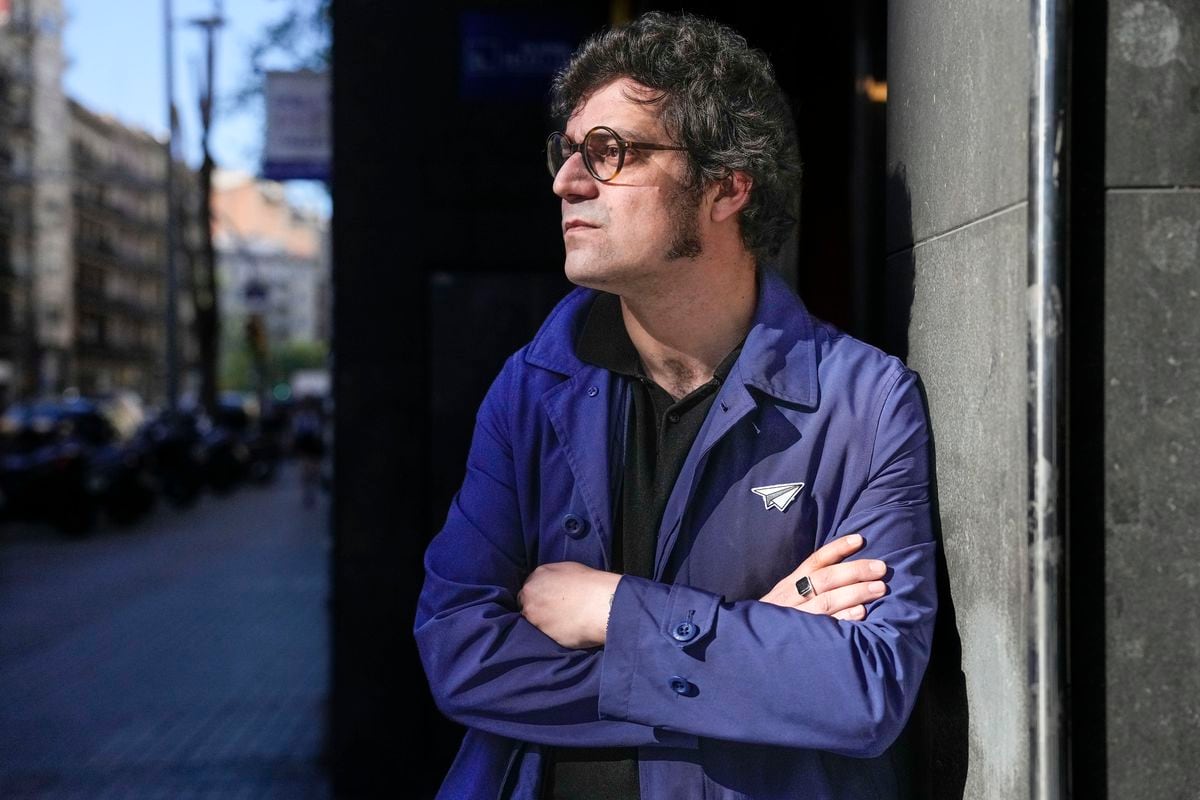As in his life, even after his death, Yoram Taharlev remained an all-Israeli consensus.
Lovers of Hebrew music consider him one of the greatest poets and songwriters who rose up for us, both in the quality of the writing and in the number of works he wrote that survived the test of time. Religious and ultra-Orthodox delve into his faithful poems and books. Generations of children continue to grow up on his children’s books and children’s songs. Poetry lovers do not miss his books, including "Yakur Farm, Draft", "The First Kiss" and "Let It Stay Between Us". And humor lovers still laugh at the jokes he made at the stand-up shows he traveled with all over the country.
Zapping between the radio stations on Saturday, on the way to an interview at his home in central Tel Aviv, proved how fruitful he was in the history of Hebrew music.
Gidi Gov sings "Ya'ala VeIvoa", Yardena Arazi answers him with "Let the sun pass over me", the tall windows tell her "You can not", Dudu flies again "I had a friend, I had a brother", Hava Alberstein walks "to the pools" , Rivka Zohar followed her in "The Road to the Village", Yehoram Gaon sings "In the Orchard by the Trough" - and the sequence continues with "Hora", "All your wonders are not over yet" and "Get up and walk in the land".
A very partial list of samples from the vast repertoire of hits he has created.
Taharlev's funeral at Kibbutz Yagur, last week.
"The Israel Prize does not bother me", Photo: Michel Dot Com
May 2021, morning in the apartment above State Square.
Dressed in jeans and a blue shirt, with the timeless white beard and white collar, Yoram Taharlev drank a cup of tea and doubted the term consensus.
"There are a lot of people who are mad at me," he smiled bastardly.
"For example, the families of the founders of Petah Tikva. More than 50 years ago, I wrote" The Ballad of Yoel Moishe Salomon and His Three Wives, "composed by Shalom Hanoch and Minister Arik Einstein. : Bird wings grow on him, he disappears, and the next day the valley is filled with the chirping of birds.
"The families of those founders of Petah Tikva struggled with the song and took out books to prove that the narrator in it is not the historical truth, and that their ancestors did not escape. Some claim there were six or seven, not five, but the song is stronger than anything, and the square in Petah Tikva '".
How does it feel to be the one who, by virtue of a song he wrote, writes history?
"Great fun, I'm kicking. Listen, I've met many times with warriors from Ammunition Hill for photos and articles, and they argue how many warriors were there in battle. I wrote 'a hundred and a few guys,' and some say 200, maybe 300. I told them - you yourself do not You know, only historians who research will know, but what will remain engraved in history is that there have been a hundred and several, because that is what is written in the poem.
"Ammunition Hill, in the center of Jerusalem, is a great site for real estate, and there were places where there were no less difficult battles.
But Mota Gur, when he was chief of staff, said himself that the reason they decided to turn Ammunition Hill into a memorial site where warriors swear - is the song. It's a song played on the radio maybe ten times a year, no more, but everyone knows it. It's strong written in Israel, and I say it modestly. "
What other songs of your are you really proud of?
"Look, I grew up in Kibbutz Yagur, at the foot of the Carmel. I think there is no Israeli who travels on the road from Afula to Haifa and does not remember" The Green Mountain Always, "which is the song most identified with the Carmel. "Mentions of places in the country, plants, trees, animals - in their names. True, I also wrote spring, field, hill, mountain, but I made sure to mention things in their names, and that creates credibility in writing."
You have become very identified with songs of nostalgia for the Land of Israel.
"I wrote most of them in the 1980s, in the second chapter of my writing, as longing for my childhood in the kibbutz. It does not bother me, because I have a very wide range. I wrote, for example, 'Let's return to the tango', 'Electricity flows in your palms', "You are my country", which for me is an erotic love song, 'there are girls', 'he is not so smart' - songs of love and passion and playfulness from a female point of view, which is a trick that allowed me to put in humor and a wink. "
Do you feel that you have imprinted a seal?
"I'm not the one to say if I made a mark. I think in the songs of the military bands I was able to describe the period, and there are the ballads left, and the songs of the children. There is no kindergarten without 'My flag is blue and white.' "Everyone Went to Jumbo" and "Barbaba" and "Father, Mother and the Land of Israel", and "Family Song", by the way, I was criticized for why there is no mother in it. "Two parents are father and mother."
Who was your model as a writer?
"In writing, I was mainly influenced by Alterman, you could say Haim Hefer. When I look at the breadth of my work today - poems on a variety of topics, books dealing with the Jewish bookcase, poetry books, children's books, books about love, shows that are mainly humor - I modestly say that in Israeli culture "Someone with a wide writing range like me. So in this respect I made a mark, I plowed a field in the land of the land. And for me, my model are the poets of the Golden Age of Spain, like Rabbi Yehuda Halevi, Avraham Ibn Ezra."
Why them?
"They were both rabbis and wrote books, love songs, songs of passion. Rihal even wrote love songs for boys, and he also wrote the book 'The Kuzari', you will find everything there.
They felt no commitment to any restrictions and engaged in everything, even though their origin was religious.
This is how I feel about my work, with an openness to a large space of doing and creating.
All my life I have been trying to look for things I have not done before and to flee from the safe ground to another place. "
You stopped writing hymns about 35 years ago because you were tired?
"Because I felt I had written enough and that my relative advantage was disappearing. Writing hymns is a matter for young people, because music is constantly changing, and I'm not at that pace of change. So why should I be there, when I'm losing height?"
Are there songs you envy that you did not write?
"Certainly. For example, 'Legend of Grass' by Meir Ariel, or 'I am a guitar' by Naomi Shemer and 'Song of the Neighborhood' by Haim Hefer. Haim Hefer and Naomi Shemer are songwriters bigger than me. I really appreciate Yankele Rotblit and Rachel Shapira "And I really like Danny Sanderson and Danny Robes. I recommended Sanderson for the ACUM Award for Lifetime Achievement as a writer, without being a candidate at all."
Over the years, Taharlev has worked with dozens of singers, bands, composers and producers, but he says he has never belonged to Bohemia, despite good connections with prominent figures, such as Avraham Desha Peshanel and Benny Amdursky.
"They were not my friends. I did not want to be involved, I did not belong to groups, it was not me. I also lived in Tel Aviv for short periods. I traveled to Rishon Lezion, Petah Tikva, Yehud and Herzliya."
"Ready to appear anywhere"
At 83, unrelenting back pain made it difficult for Taharlev to move and caused him suffering. Still, he did not give up daily sitting on the bench next to his house, smoking a cigar, and of course not going out to performances, where he presented his songs and told their way about the country and the country in a humorous way. "For shows I go by Bay Hawk and Bay Crook," he smiled in his characteristic language. "They revive my soul. I see the crowd - and my back pain disappears for two hours." If in the not-too-distant past he performed about 180 times a year, at the end of his life he dropped to a rate of 10-8 performances a month, some in a limited ensemble that includes another player and singer, and some in an expanded ensemble with several participants on stage.
The day before our meeting, Taharlev performed in Kfar Adumim across the Green Line, a performance in a private house also attended by Supreme Court President Judge Esther Hayut, herself a graduate of the military bands. "She was a guest of the landlady, who was celebrating a birthday. Hayut was a member of the Central Command band, but for the band she was a member of I no longer wrote, but moved on to write for the Navy band." His military repertoire, by the way, is also impressive: "The Tune Always Comes Up", "Paratrooper's Song", "My Salt", "He's Just a Armored", "Men of Silence", "Yiddish Pirate", "Haska", "Armored 69 ". Again, a partial list.
"I know to recognize quite at the beginning of a show if it's an audience intelligent enough to understand the nuances of the stories and jokes, and according to that I adjust the performance. It's not that another audience does not enjoy - but it will flow less with me. I also adjust myself to the audience's religiosity. Appears to a religious audience, I remove from the show all the parts that deal with him and her, excerpts of erotica from the book 'The First Kiss'.
And a religious audience knows and loves it.
The researcher of Hebrew music, Eliyahu HaCohen, defined Taharlev as the secular writer who is most connected to Judaism in his songs and books.
He wrote books of Jewish morality and spirituality, commentaries on this week's Torah portion and Tractate Avot, and a book on women in the Bible. .
Surprisingly, all of these come from a secularist who testified that he did not believe in God at all.
"At the kibbutz we studied a lot of the Bible, and in my youth I received the book of the legend of Bialik and Rabnitzky as a gift.
I am self-taught.
Over the years I have read a lot of books from the Jewish bookcase, especially the morality and wisdom literature.
Listen, this is our ancient literature, we have no other. "
And this strong connection to Jewish literature does not make you believe?
"No, I'm not a believer, I eat carnivores, but it fascinates me intellectually."
Does it bother you that such songs get a reference or appropriation, which may be political?
"Absolutely not. I'm aware that my songs reach different groups in the population, even if they are small, and they are very expensive for those groups. I have a song called 'The Legend of the Lord', which was sung by a bad duo.
It is less well known, but everyone connected to Gush Etzion knows it.
I have a song called 'White Autumn', which is only known to those who dance folk dances.
"Everyone who dances knows him, but only they."
Do you have a political affiliation?
"I grew up in the socialism camp and my soul belongs there. I voted in elections, but I was never politically involved, and I did not want to be involved in political groups."
Unlike others from his political camp, Taharlev willingly appeared beyond the Green Line as well.
"I have no problem performing anywhere, if it's not dangerous. At certain times, if it's dangerous - I ask that they send an armored vehicle to pick us up and stumble wherever we can go in. I performed at the summer camps of the religious youth movement 'Ezra'. It's my audience. I never boycotted anyone. "
And when your song is appropriated to a particular political camp, does it bother you?
"No. In the song 'There is no way back' there is the line 'they called Palestine - Israel'. In my performances there are groups of settlers, who when they sing this line they get up with the Israeli flag they brought with them from home. But they adopt the song to them with their interpretation.
"People also find in my songs things I did not know existed. A religious woman told me that they sing 'On his hand he will bring' in Shabbat hymns, because it is a song about King David. I corrected her and told her it was about Elijah the prophet, and then she quoted me: 'He builds The city has been around for 70 years. And he dreams that just as you built the city, he will leave the cornerstone to the temple. From the secular audience. "
He recounted how he increased and agreed to change lyrics in the huge hit "Let the Sun Pass Over Me" for the faithful singer Avraham Fried. "The word 'love' in the last house did not suit him, because of his audience, so I changed from 'old love' to 'old well', and instead of 'when I first loved' I changed to 'more springs as first'. I do not care, I want "That it will reach the audience. Hear, when Tchernichovsky was invited to read 'Hoy Artzi, Moledet' at the Zionist Congress, he changed the song and made it more optimistic, because the source was very pessimistic, because that is the message they wanted him to convey."
Taharlev's commentaries on this week's episode recently starred on his Facebook page, which has 36,000 followers.
Every Friday, his wife, Batya Keinan, published the relevant commentary for that week from his book "Simchat Torah", and each publication drew hundreds of responses that included compliments, discussions and debates.
"In my commentary there is humor, which is lacking in the commentaries of commentators and rabbis we know, that they are not creative enough or that they do not want to convey humor. I also have Torah innovations. "Because the one who converts gets the name 'Ben Avraham' and Avraham Geyer about 300 people, so they added that Avraham gave birth to him, so that they would not mistakenly think that Yitzhak Guer was. I told such interpretations at a conference on Tisha B'Av, and rabbis applauded me."
"I felt like I wrote enough songs."
The late Taharlev with his wife, Batya Keinan, May 2021, Photo: Moshe Shai
During the Corona, Taharlev became a kind of network star through Facebook.
With the help of his wife, he filmed and uploaded dozens of humorous videos, in which he talked about the situation and was inspired by it, and most of them garnered tens of thousands of views.
One of them, about the hero Samson who came to visit his parents in sheltered housing with his beloved Delilah, including excerpts in Yiddish, received no less than 355,000 views.
In one video he recounted: "A city car called for everyone to wear masks in public space, and maybe people did not realize it was aimed at them. Like the couple going to celebrate 40 years of marriage in a restaurant. The woman raises a glass of wine and says: 'I want to say thank you for all these years, you You made me happy and encouraged me in moments of sadness and despair. 'So her husband asks her,' Are you talking or is the wine talking from your throat? '
And his wife replies, "I'm talking to the wine."
In his final year, Taharlev received a special tribute from the music company Aroma Music, which decided to renew some of his great songs performed by young and veteran artists.
The project is called "Yaela VeIvoa", and so far it has included innovations by Yonatan Razel for "God's plot" and by Liron Amram for "For the Pools".
One of the standout songs on the project, which also came out as a single, is the new song "No Last Love," sung by Taharlev's granddaughter, Kama Vardi, in a sweet bell ringing.
"It makes me very happy, and I was very excited to meet the singers who sing the songs in the project," admitted Taharlev. Their interpretations of my songs were very special to me. "
For the first time, as part of the project, Taharlev also gave his voice in the song, performing for "Nights" accompanied by the Gevatron.
His voice in the performance sounds not bad at all.
"Kobi Ben Atar, the artistic director of the project, who lived here in a two-story building above me, played me sketches and performances, and I knew he was looking for a performance to sing 'Nights.' I sat down at my desk, picked up the phone, opened it and recorded myself singing. "And I said to him, 'Here, you have an operation.' The production company agreed, and at the age of 83, accompanied by the Gevatron, I became a singer."
In his youth.
"I am self-taught", photo: from the private album
"There are distortions in the Israel Prize"
In 1963, Taharlev married the writer Nurit Zarchi, the bride of the Israel Prize for Literature in 2021. They had two daughters, the painter Roni Taharlev and the journalist and doctor Erela Taharlev Ben-Shahar.
After 13 years of marriage, they divorced, and two years later he married Linda, a native of the United States. They had a son, Daniel, and a daughter, Michal. The late Linda passed away a decade ago.
In 2014, he married Batya Keinan, a former spokeswoman for the President's House in the days of Ezer Weizmann.
"When I come to the rabbinate and am asked to fill out a married, divorced or widowed form, I fill in the three boxes," he remarks humorously.
He maintained a good relationship with Zarchi, and was even happy to win her the Israel Prize, which he avoided - even though he was nominated for it every year in the Lifetime Achievement category, and once every few years in the music category.
How much does it bother you that you have not received the Israel Prize to date?
"Really does not interfere. Look, there are endless distortions in the Israel Prize. All the recent committees have only given to composers, as if the lyrics in the songs are not important. "But Shoshana Damari and Yaffa Yarkoni broke this tradition."
Yet?
"Tell you the truth: what can the Israel Prize give me, other than the title I won for the Israel Prize? I am not a professor of chemistry, which the prize gives him sudden and short-term recognition. Can earn anything from it, except the title. So they will give me the Israel Prize? For fun. They will not give me? Even for fun, nothing happened. I sum up my life with gratitude for what was given to me, and not for what is not. me".
It's a prize that the state gives for a special donation, and you donated.
"Okay. Look, there are groups of people on the net, on Facebook who recommend me for the Israel Prize. I do not know if the phenomenon also exists in others. There are people who organize for it, and it excites me very much. But it does not affect me."
Do you share a cliché that used to be better here?
"No, because it's not true. Nostalgia is a longing for a place I would not really want to return to. It also seems to us that there used to be more solidarity here and that the people were united. I have an article by AD Gordon from 1914 in which he complains about solidarity.
Every generation thinks the previous generation held on to more genuine values and held on to them more firmly, and I do not think that is true.
I do not think in the '60s and' 70s there was a feeling that everyone was together.
There have always been struggles, disputes and civil wars.
It has accompanied the Jewish people throughout the ages. "
And today?
"Today we see social and human phenomena that are difficult to accept, and on the other hand we find social phenomena of kindness, sacrifice and willingness. Sages said that this people always gives, needs to round and gives, needs to temple and gives - the people always give."
So what bothers you anyway?
"Human relations here are terrible, and there are baseless wars between the tribes here, which make for a difficult mood. But there is a pendulum in this matter as well, which must reach a high extreme in order for the pendulum to return to its place."
Do you, as a creator, have a role of connection? Of creating a bridge?
"Certainly not a role. I did not take on the mission of being a connoisseur of parts of the people, but perhaps I am filling some space that exists. I do what I love and what I can express a statement in."
So you do agree?
"In general, yes. I feel that a lot of people connect with what I do. During the Corona, I appeared to an ultra-Orthodox family in the village of Chabad, which gathered before Rosh Hashanah.
"One of the hosts wrote a song in my honor, rhyming with it: 'Taharlev's visit to the Rebbe's village, it's like an El Al visit to Abu Dhabi."
How long will you continue to perform?
"Ask me what age I want to live at all. Health? Have you seen an 83-year-old man whose health is okay? Health is okay in general. Listen, meanwhile shows are the drug of my life, when I see an audience I wake up."
asafnevo444@gmail.com
Were we wrong?
Fixed!
If you found an error in the article, we'll be happy for you to share it with us





/cloudfront-eu-central-1.images.arcpublishing.com/prisa/FKMVIPMZEFFIDGMU5MJJ4OHT5M.JPG)









